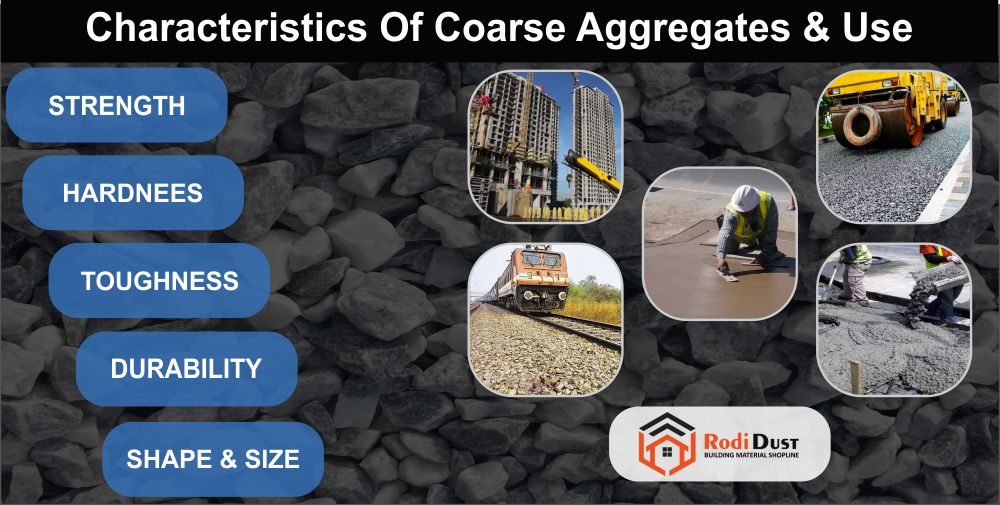Coarse Aggregates Characteristics their use
“The irregular broken stone or naturally-occurring rounded gravel used for creating concrete are Coarse aggregates. Materials which are large to be retained on 4.7 mm sieve size are called coarse aggregates, and their maximum size can be up to 63 mm”.
Coarse aggregates are generally obtained by blasting in stone quarries or by breaking them by hand or by crushers. Machine – crushed stones consist of stones of various sizes whereas Hand – broken aggregates consist of only single size stones. To produce hierarchal aggregates for elegant concrete, they are again mixed in specific proportions.
They should be washed well before using in concrete. Coarse aggregates for structural concrete consist of broken stones of hard rock like granite and limestone (angular aggregates) or river gravels (rounded aggregates). For non-structural mass concrete of low strength, broken bricks, foamed slag, clinker, etc., may be also used as coarse aggregates.
Foreign materials in coarse aggregates such as coal, lignite, soft fragments, and clay lumps should not exceed 5 per cent of their weight.
Maximum Size of Aggregate for Various Works
• For Non-reinforced work, the maximum size should be from 40 to 75 mm (1.5 to 3 inches).
• For R.C.
Foundation work, the most size ought to be from forty millimetres (1.5 inches).
• For R.C. work (beams, columns, slabs in buildings), the maximum size should be from 20 mm (3/4 inch).
• For Shell roof and thin members, the maximum size should be from 10 mm (3/8 inch).
Storing of Aggregates
Aggregates should be stored and handled carefully to avoid contamination from dirt. They should also not be segregated, and their moisture content should remain relatively constant.
The selected site should be a clean dry and hard patch of ground, keeping in view the position of the mixer and the convenience in handling. If a good place is not available, then an artificial platform shall be prepared out of planks, galvanized iron sheets, bricks or lean concrete.
Fine aggregates and different sizes of coarse aggregates must be stored in separate blocks. To prevent segregation, successive consignments should not be dropped on the older piles to form a pyramid. In order to avoid excessive variation in moisture content, each pile of aggregates must be stored in a large area but low in height not exceeding 1 m.
To prevent segregation, successive consignments should not be dropped on the older piles to form a pyramid. In order to avoid excessive variation in moisture content, each pile of aggregates must be stored in a large area but low in height not exceeding 1 m.
They shall be allowed to stand for at least one day before use. Conical blocks must be avoided as they assist segregation.
Testing of Aggregates
The routine and other tests usually prescribed on coarse aggregates are as follows:
Test for particle size: This test is carried out in the field by sieve analysis.
Test for shape: According to the shape, aggregates are classified as below:
• Rounded
• Irregular or partly-rounded
• Angular
• Flaky
The shape of aggregates becomes important in the case of high strength or high-performance concrete where low water-cement ratios are to be considered. Mostly, cubical-shaped aggregates are preferred for better workability.
Test for elongation index (flakiness): The laboratory test for shape is called a test for flakiness or elongation index. For this test, a sufficient quantity of samples should be taken so that the minimum number of 200 pieces of any standard size fraction is to be tested.
This test is not used for aggregates sizes smaller than 6.3 mm.
Test for impurities: The percentage of fines and the clay content can be found by immersing the aggregate in water and examining the suspended particles in the water.
Test for Moisture Content: The drying method in an oven or heating in an open pan in the field is an easy test to be carried out. This can also be done by pouring an inflammable liquid-like methylated spirit and lighting it to evaporate the water.
Very good coarse aggregates are necessary for durable concrete construction in buildings and also in road works. In our country, IS 383 and IS 2386 deal with the requirements of coarse aggregates for concrete.
More About Rodidust
Visit: https://www.rodidust.com
Address : 16/43,U-Block,DLF-3Gurgaon,Haryana 122001,India
Email: info@rodidust.com
Phone: 8368450521
Comments
Post a Comment